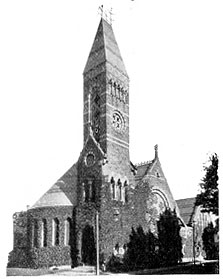 Left: Rev. S. G. Buckingham, D. D. Left: Rev. S. G. Buckingham, D. D.
lower gate. These are all the visible signs of a military rêgime, and even the gate sentry has taken to leaving his gun in the house of late.
For some time after the Armory was established, the armorers were a hard lot of men. "The most skilful mechanics in those days," we read, "were discharged soldiers, deserters from the British regulars, and foreign troops who had been under British authority." They were a set of lawless, unprincipled mercenaries, who defied all control, and quite ignored individual rights. They ravaged gardens, robbed henroosts, and committed depredations far and near. That state of affairs long ago ceased. Among the "armorers" of later years have been some of the very best citizens,—men of education, men of property, members of the city government, men holding important offices in the city and the state. Many began to work at the Armory in early youth. They not only made homes for themselves in Springfield, but induced their relatives and friends to come and take up their residence with them. It is impossible to estimate the influence of the Armory in the building up of the city; but no one can doubt that it has been great. Some assert that it has been indirectly the chief cause of the city's growth and prosperity; but other factors have, in later times, played an important part.
In 1860, when mutterings of the approaching storm were heard, citizens of Springfield formed a committee to watch the Armory and protect it from Southern agents. These might easily have destroyed the entire works before the government had time to place a sufficiently strong guard upon the grounds. During the war, in 1864, an attempt was actually made. Two strangers in some way obtained admission to the grounds and the Arsenal, —something that the citizens themselves could not always easily accomplish at that time. The men were so closely watched, however, that their plan failed. Shortly after their departure, a small bomb was found in the main Arsenal building, but in a place where the explosion of so small a bomb could not have done much harm. No fuse had been lighted; the bomb had simply been cast aside. The probable plan was to throw it into the coal bin, that it might explode under the boilers and disable the engine. But the men were not allowed to enter the machinery buildings. At one tune strangers were seen prowling about the United States Water Shops, and a sentry sent a bullet whistling by their ears. The importance of protecting the works at Springfield will be readily seen. The destruction of the arsenal at Harper's Ferry left Springfield for a time the main source of supplies for the government. It will be remembered that just before the struggle began, our War Department took most of the arms away from Northern arsenals. When a

South Congregational Church.
-- Page 12 --
© Laurel O'Donnell 1998 - 2005, all rights reserved
This document may be downloaded for personal non-commerical use only
and should not be reproduced or distributed without permission.
|
 Left: Rev. S. G. Buckingham, D. D.
Left: Rev. S. G. Buckingham, D. D.
